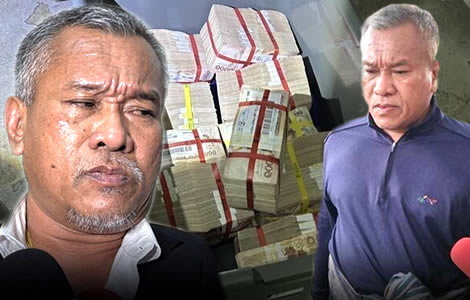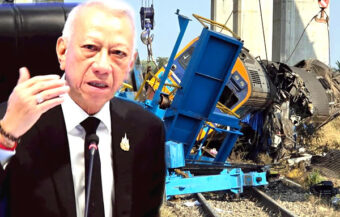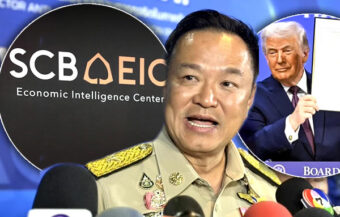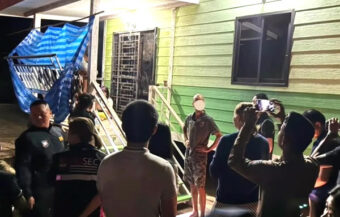฿12 million in cash found dumped at a Bangkok condo is now tied to a secretive influence campaign by a major firm backing the unpopular Chana Industrial Estate, with investigators probing links to lobbying, money laundering and potential official misconduct.
As pressure mounts on lawyer Thaweewat Saengkaew from both the Revenue Department and police agencies over the ฿12 million found in a condominium on the outskirts of Bangkok, a more plausible explanation for the money has begun to emerge. Evidence uncovered by investigators suggests the funds may be linked to an influence-peddling or public relations programme launched by a major firm in 2020 and 2021. Chana, a coastal town in southern Songkhla province, had been proposed as the site of a controversial industrial development. The project faced strong and sustained opposition from local communities. Ultimately, the mounting public resistance was enough to bring the project to a standstill by the end of 2021.

Police have speculated on the origin of ฿12 million in cash discovered in a Muang Thong Thani condominium complex trash area on June 5th. The money was withdrawn from an industrial conglomerate tied to the controversial Chana Industrial Estate project. Authorities now say the trail is clear and traceable.
The discovery shocked the public last week. A sealed box containing bundles of cash was found beside a garbage pile. The location: a condominium storage area in Muang Thong Thani. Mr. Thaweewat Saengkaew later came forward to claim the funds. He insisted the money came from his work as a lawyer dating back to 2020.
However, police investigators have now qualified that explanation.
Police say cash trail leads to major industrial firm behind controversial Chana coastal development project
Following a detailed financial investigation, the Provincial Police Bureau 1 revealed the real source. The money came from a major industrial company. That company is owned by a well-known business tycoon. It operates in construction materials, petrochemicals and waste processing.
Importantly, the company has financial and political interests in the Chana Industrial Estate. This controversial project has triggered fierce resistance in Songkhla’s Chana District. Locals, especially fishermen, fear it will destroy the coastal ecosystem and their livelihoods.
According to banking records, the ฿12 million was not withdrawn all at once. Instead, it was taken out in multiple transactions during 2020. Each withdrawal amounted to ฿1.9 million. While legal, the timing and amounts were highly calculated.
Notably, any cash withdrawal over ฿2 million baht must be reported to the Anti-Money Laundering Office (AMLO). By staying just under the threshold, the transactions escaped automatic scrutiny. Nevertheless, once the stash was found, investigators moved swiftly to reconstruct the money trail.
Four linked companies quietly moved funds from the industrial giant before shutting down operations in 2021
Further investigation revealed a web of corporate connections.
The money flowed from the industrial giant to four smaller companies. Each of these companies was directly or indirectly tied to Mr. Thaweewat. Although they appeared legitimate on paper, all four ceased operations by 2021. Their financial activity was minimal. In fact, their main function now appears to have been money movement.
Importantly, this financial trail links back to 2020. That year, the Chana Industrial Estate faced a key public hearing. The hearing was part of the legal process to approve the project. Tensions were high. On one side stood local villagers. On the other were groups supporting the estate.
Authorities now believe these funds were used to organize or influence the pro-estate faction. While it remains unclear how the money was spent, investigators believe some of it paid for mobilization. These included transportation, staging and other campaign-related expenses.
Additionally, Thaweewat has long been seen as a legal and strategic figure in industrial lobbying. His involvement in contentious infrastructure projects is not new. But this is the first time cash transfers have tied him to direct financial operations.
Transfers followed a clear pattern that police say fits laundering evasion behaviour used to avoid detection
The pattern of cash movement was consistent. Each company received transfers from the parent firm. Then, they withdrew the funds in near-identical sums. This happened repeatedly over several months. After the withdrawals ended, the companies were closed.
In light of these findings, authorities now suspect intent to avoid detection. Although structured to appear legal, the behaviour fits known anti-laundering evasion patterns.
Moreover, the source company’s connection to the Chana project adds political implications. Public protests have long alleged that pro-estate groups were not grassroots supporters. Instead, they claimed external interests funded their presence. These new revelations support that view.
A police source close to the case stated, “This is not typical business activity. It looks like disguised political funding.”
Furthermore, investigators are now examining if any public officials were aware of the transfers. The National Anti-Corruption Commission (NACC) has been alerted. A preliminary inquiry is underway. It will assess whether state actors assisted or ignored the scheme.
AMLO and tax authorities now investigating all transfers and questioning lawyer’s financial claims and taxes
Meanwhile, AMLO has launched its own probe. The agency is tracing each transaction between the industrial group and the four companies. If any part of the money flow violates financial regulations, AMLO may file separate charges.
According to legal analysts, even if the money was used for lobbying, failing to report the origin may constitute a criminal offence. If proven, it could lead to asset seizure and formal prosecution.
Despite earlier claims, police have not fully accepted Mr. Thaweewat’s explanation. Certainly, they are aware that he is the custodian of the monies.
Initially, he said the money was from accumulated legal fees. He claimed to have kept the funds in cash since 2020. However, no corresponding income records have been found. Tax filings from that period show no declared earnings that could match the amount.
As a result, Mr. Thaweewat will soon be summoned for formal questioning. Police intend to ask about his relationship with the companies and their financial behaviour. Investigators also want to know why the funds were hidden and not deposited in a bank.
Public outrage grows as villagers and activists say paid support for the project undermined democratic process
Community leaders in Chana responded swiftly to the news.
“We’ve always known something wasn’t right,” said one village organizer. “Now the truth is coming out. It wasn’t fair from the start.”
Environmental groups have renewed calls to halt the Chana project entirely. They argue that if support was paid for, then public consent was manipulated. “This undermines the legitimacy of the entire process,” said an activist from the Save Chana Network.
So far, no criminal charges have been filed. However, police confirm the case is far from closed. They continue gathering documents and testimonies. If more individuals are found to be involved, legal action will follow.
Cash in a plastic box millions: lawyer claiming money is the husband of top anti-corruption agency official
Top lawyer steps up to claim ฿12 million thrown out in the trash. Says he kept it at his condo for safety reasons
฿12 million in neat cash left out as trash in a suburban condo building. Woman sought to use a plastic box
In the meantime, the future of the Chana Industrial Estate is again under scrutiny. Government officials now face pressure to explain how such a large sum of money quietly entered the debate.
A cabinet-ordered review of the project’s social environmental impact remains unpublished. Analysts have long requested that the findings be made public. They argued that transparency is essential. This is now especially true in light of recent developments.
The project entailed a vast development including industrial estates, deep sea port and biomass power plants.
For now, the ฿12 million remains in police custody. Its origin is no longer in question. However, its purpose—and its wider links—may still take months to fully uncover.
Join the Thai News forum, follow Thai Examiner on Facebook here
Receive all our stories as they come out on Telegram here
Follow Thai Examiner here
Further reading:
Thaksin to address state board on drug suppression despite howls of protest from human rights groups
Health Minister Somsak launches regulatory blitz to outlaw non-medical cannabis use within 40 days


















